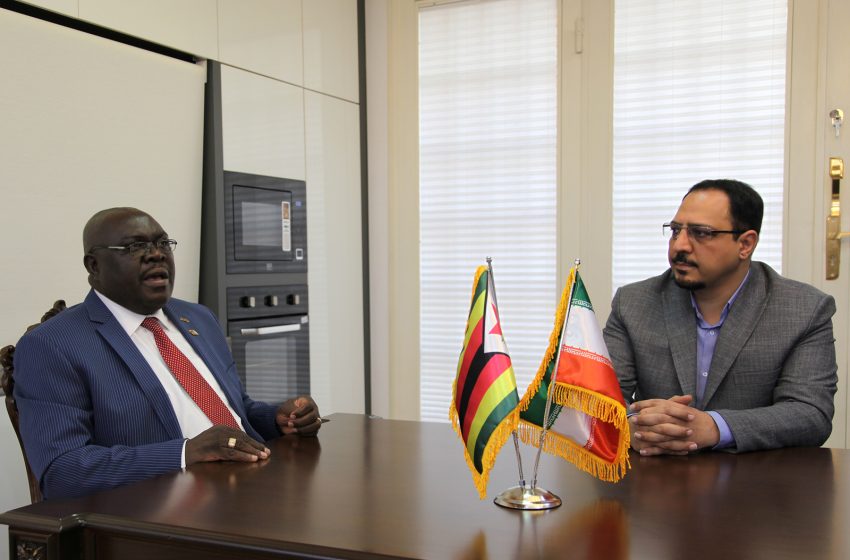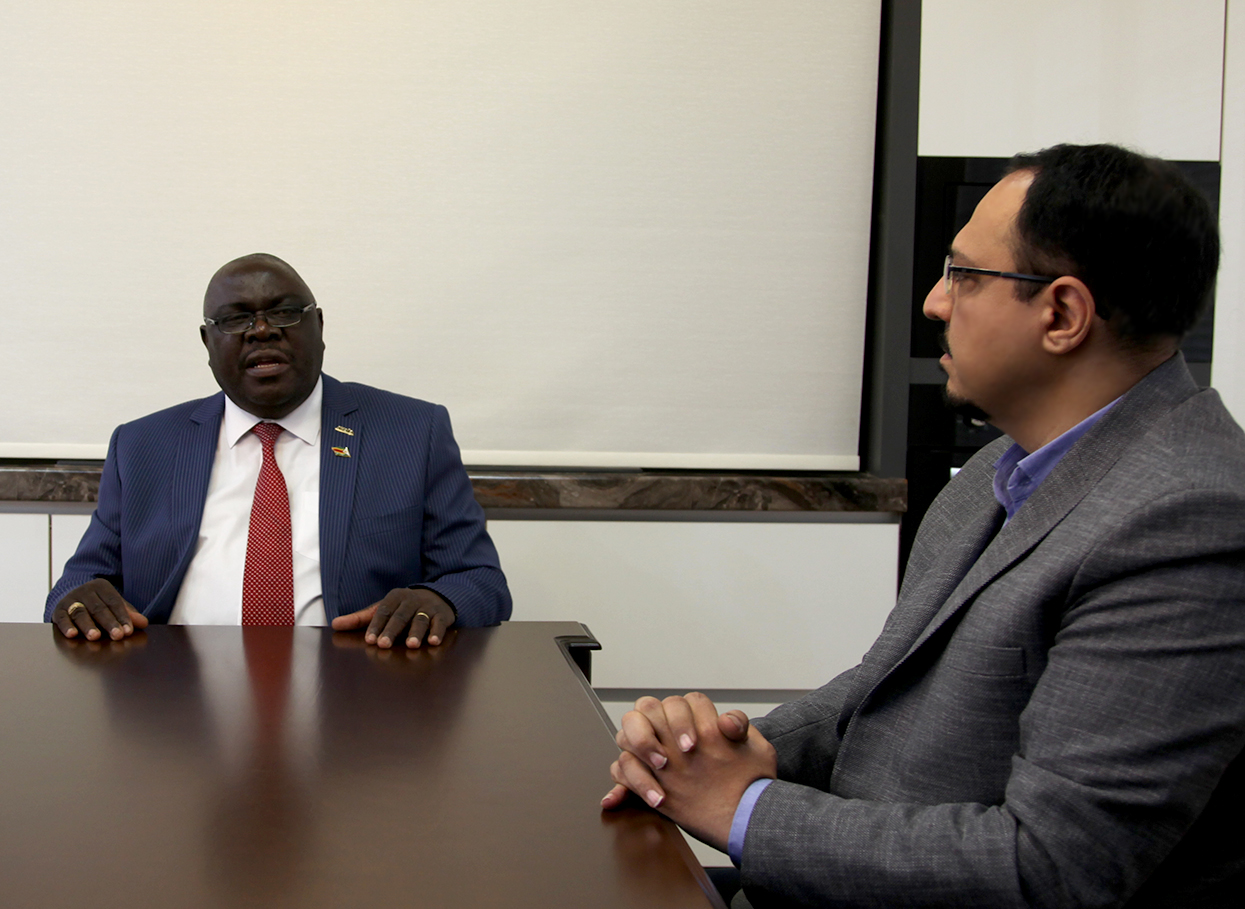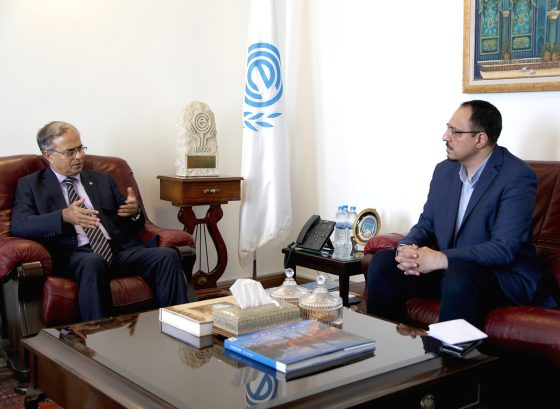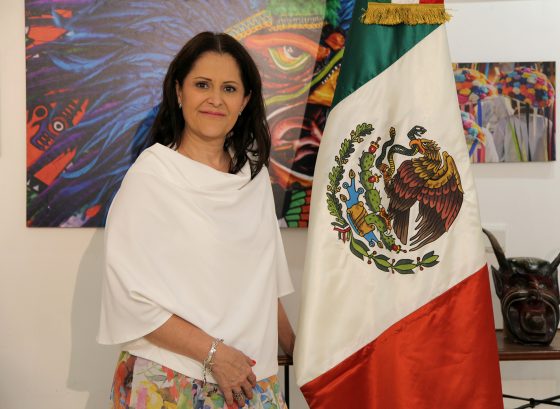“Iran is a Critical and Strategic Member within the Global South Community.” Says the Zimbabwean Ambassador to Iran

Zimbabwe, a landlocked country, is bordered by South Africa to the south, Botswana to the southwest, Zambia to the north, and Mozambique to the east. Its vast and diverse territory, spanning approximately 390,000 square kilometers, showcases a breathtaking array of landscapes, from lush savannas and majestic mountains to the awe-inspiring Victoria Falls, a UNESCO World Heritage Site. Additionally, the country’s unique flora and fauna, comprising a remarkable diversity of wildlife such as lions, elephants, and rhinos, constitute an unparalleled natural treasure. However, Zimbabwe has faced numerous political and economic challenges since gaining independence in 1980. Despite these hurdles, the country possesses undeniable potential for development. This potential stems from its young and dynamic population, a valuable asset for its future, as well as its rich mineral resources, particularly gold, chrome, and platinum, alongside its fertile lands, which offer promising prospects for Zimbabwe.
AVA Diplomatic’s Exclusive Interview with
H.E. Mr. Bright Kupemba, Ambassador of the Republic of Zimbabwe to Iran
Prior to assuming the position of Ambassador to Iran, what diplomatic positions has His Excellency held? How will your experience and expertise in diplomacy contribute to enhancing relations between Iran and Zimbabwe?
I have had a long diplomatic career spanning more than three decades, serving in different regions of the world including Europe and Africa. It is this experience that helps navigate the complex diplomatic terrain of the Middle East and most importantly to ensure the existence of enduring relations between Zimbabwe and Iran.
What tangible outcomes did the recent meeting between the presidents of Iran and Zimbabwe in Harare yield for the two countries?
Certainly, the meeting elevated the relations to another level signified by a recalibration of the existing bilateral relations to focus more on economic diplomacy.
Were any new agreements or contracts signed between the officials of the two countries during this visit?
It is a matter of public record that about a dozen MoUs were signed during President Raisi’s State visit covering several sectors of socio–economic activity including health and agriculture.
What role can the Islamic Republic of Iran play in solving the problems and challenges facing Zimbabwe?
Zimbabwe and Iran are countries under unilateral and illegal sanctions imposed by the United States and its allies, as a result of assertiveness and identical policy of resource nationalism. Iran has defied all odds and posted tremendous development indices in the 45 years they have been under sanctions. In this regard, the Islamic Republic has turned to internal resources and capacities to excel. Zimbabwe has adopted through its mantra “Nyika inovakwa nevene vayo” [meaning – Zimbabwe shall be built and developed by Zimbabweans], a similar inward looking model to turbo charge development processes in the face of hostile traditional sources of funding. Zimbabwe can thus take a leaf from Iran which has done amazingly well under excruciating western sanctions.
What role can Iran play in the development and progress of Africa?
Within the context of South–South Cooperation, Iran can play a significant role in knowledge transfer in various fields, technology transfer, trade and value addition of Africa’s abundant natural resources. With advent of the African Continental Free Trade Area [ACFTA] there are opportunities for trade driven development.
Considering the rich cultural capacities of the two countries, what programs have been adopted by the authorities of both countries to expand cultural and scientific exchanges between Iran and Zimbabwe?
Through the Joint Permanent Commission on Cooperation [JPCC], a framework for cooperation in arts and culture as well as innovation, science and technology, there have been exchange visits/delegations to explore various areas of scientific advancement. The promotion of tourism in Iran and Zimbabwe also encourages cultural exchanges. Mutual relaxation of visa regimes by both countries demonstrates commitment for deeper people to people interface, thereby exchanging cultural experiences.
Are there any areas for joint cooperation in the fields of art, sports, and tourism between the two countries?
 I have pointed out that a Joint Permanent Commission on Cooperation between the two countries exist covering diverse sectors of human activity that include arts, sport and culture. Tourism as indicated earlier in gaining currency. An MoU exists on tourism and Zimbabwe’s participation at the 2024 Tourism Expo in Tehran was the genesis of the envisioned sustained cooperation in this sector.
I have pointed out that a Joint Permanent Commission on Cooperation between the two countries exist covering diverse sectors of human activity that include arts, sport and culture. Tourism as indicated earlier in gaining currency. An MoU exists on tourism and Zimbabwe’s participation at the 2024 Tourism Expo in Tehran was the genesis of the envisioned sustained cooperation in this sector.
What was the volume of trade between Iran and Zimbabwe last year?
The national statistical offices for both countries have not yet released the final computations. However, there has been a significant increase judging from activity on the ground.
What are the areas for joint investment between the two countries?
There are abundant opportunities for joint ventures between Zimbabwe and Iran especially in the fields such as mining, agriculture, manufacturing and health. Agriculture and health provide low hanging fruits given the perennial demand for agricultural products and healthcare in both countries.
What are the most important export and import items between the two countries?
Given Zimbabwe’s strength in agriculture, Iran’s imports from Zimbabwe are inclined towards that sector especially horticultural products and other cash crops. Zimbabwe’s business would be interested in importing petro-chemical products like oils, lubricants, fertilizers as well as bitumen from Iran.
What steps have been taken to strengthen scientific and technological cooperation between Iran and Zimbabwe?
The Islamic Republic has made enormous strides in innovation, science and technological development which Zimbabwe is eager to tap into. As such scientific and technological cooperation is one of the major areas of cooperation within the framework of the JPCC. In this regard exchange programs and knowledge transfer initiatives are underway between Zimbabwe and Iranian technological institutes and organizations.
What cooperation do Iran and Zimbabwe have in the fields of education, exchange of professors and students, conducting joint research, and awarding scholarships?
Cooperation in education provides a firm foundation for mutual understanding given the significant role the academia plays in shaping the destiny of peoples and states. Therefore, Zimbabwe and Iran have undertaken to accelerate cooperation in the field of education through research and development [R&D] and awarding of scholarships especially in critical areas of engineering and medical sciences.
How many tourists have visited each other’s country in the past year? What steps have been taken to facilitate travel for tourists between the two countries? What are the challenges in developing tourism relations between Iran and Zimbabwe?
 Tourism between Iran and Zimbabwe has not been very vibrant. However, after the Covid19 pandemic, tourist arrivals in Zimbabwe from Iran increased significantly. There is however, need to do more to market destinations and tourism products in the respective countries. It is hoped that the mutual relaxation of visa regimes in both countries could raise figures for tourist arrivals at the two destinations. Zimbabwe’s participation at the Iran International Tourism Expo 2024 should be viewed as an important step towards strengthening cooperation in the tourism sector.
Tourism between Iran and Zimbabwe has not been very vibrant. However, after the Covid19 pandemic, tourist arrivals in Zimbabwe from Iran increased significantly. There is however, need to do more to market destinations and tourism products in the respective countries. It is hoped that the mutual relaxation of visa regimes in both countries could raise figures for tourist arrivals at the two destinations. Zimbabwe’s participation at the Iran International Tourism Expo 2024 should be viewed as an important step towards strengthening cooperation in the tourism sector.
What is the view of the Zimbabwean government on the recent developments in the Middle East and the Hamas-Israel war?
The Zimbabwe Government always condemns the loss of human life caused by wars and the Hamas–Israel war is no exception. Human suffering must stop and a diplomatic solution should be pursued to resolve the conflict and engender peaceful co–existence.
What role can Iran, in cooperation with Zimbabwe, play in the development process and the establishment of peace in Africa?
Iran is a critical and strategic member within the global south community in which Africa is a significant player now and into the future of the emerging multipolar world. Cooperation between Iran and Zimbabwe should be viewed as a microcosm of relations between Iran and other African States and the entire global south in their quest to drive development processes in Africa and other deprived regions of the world. Iran’s accession to BRICS should also be viewed as a positive development within the context of the desire to engender peace and development globally.




